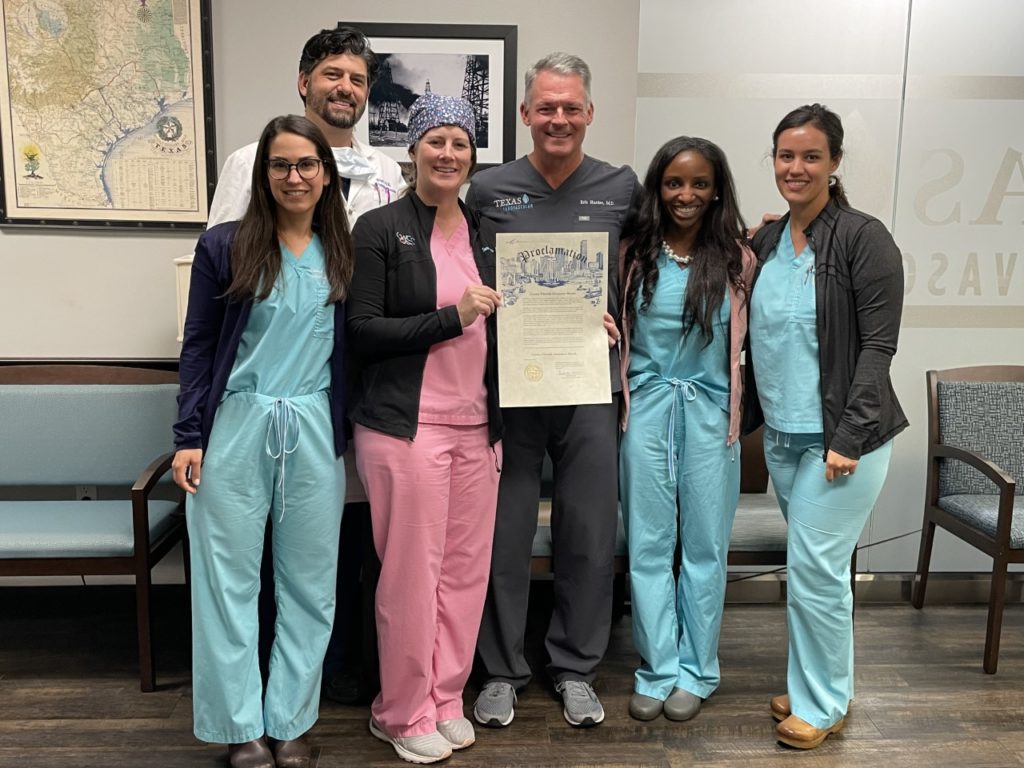More than 320,000 women in Houston are at-risk for developing uterine fibroids with African American women disproportionately impacted

From Left to right: Paulina Astiazaran, MD, Complete Women’s Care Center (CWCC), William Fox, MD, Houston Fibroids, Sara Jurney, MD, CWWC, Eric Hardee, MD, Houston Fibroids, Kandace Joye, MD, CWWC and Mariana Karram, MD, CWWC, holding the mayor’s proclamation for Uterine Fibroid Awareness Month. Between 70- and 80-percent of women will develop uterine fibroids between the ages of 35 and 54, leaving roughly 321,902 women in Houston today at-risk for developing the disease.
In recognition of local efforts to educate women about uterine fibroids and the many treatment options available, Mayor Sylvester Turner has designated the month of July as Uterine Fibroids Awareness Month. Local doctors from Houston Fibroids and Complete Women’s Care Center are using this month, and every month, to highlight this common, but often overlooked disease.
Uterine fibroids are non-cancerous tumors found in the uterus and are one of the most common diseases of the female reproductive system. They are often overlooked by patients, because they can develop and grow asymptomatically, eventually requiring medical intervention. Between 70- and 80-percent of women will develop uterine fibroids between the ages of 35 and 54, leaving roughly 321,902 women in Houston today at-risk for developing the disease. The disease disproportionately impacts African American women who develop fibroids earlier in life and with more severe symptoms. Of the nearly 283,000 African American women living in Houston, up to 25-percent may develop fibroids between the ages of 18 and 30, and by age 35, up to 60-percent may have developed the disease.
“Uterine fibroids require medical intervention, but there are many different options for treatment under that large umbrella, including both traditional surgical and non-surgical interventions,” said Dr. Eric Hardee, an interventional radiologist at Houston Fibroids who pioneered trans-radial uterine fibroid embolization (UFE) alongside Dr. William Fox. “There’s no one answer for the treatment of uterine fibroids. It depends on the individual patient. That’s why early detection and counsel with a doctor is so important.”
Information and educational materials regarding the truth about uterine fibroids, the symptoms and causes, the outcomes, and potential treatment options can be difficult to access or are inaccessible, leaving women without the information needed to make informed personal decisions about their healthcare. It also means that many women may be living with undetected fibroids for years, until something goes wrong.
“I suffered a prolapsed uterus and later found out that it was the result of uterine fibroids, weighing it down so much that I felt like I was giving birth,” said Yolanda Rhodes, a local nurse who was diagnosed with uterine fibroids just after her 50th birthday. “There were both surgical and non-surgical options available to me. After talking with Dr. Hardee, I was able to make the choice to have non-surgical uterine fibroid embolization to resolve my fibroids.”
Dr. Sara Jurney, a board-certified obstetrician and gynecologist at Complete Women’s Care Center added, “Access to health education resources and accurate information is one of the most important parts of building and maintaining a healthy community of women in Houston. The commitment of Mayor Turner and our community to creating more awareness of uterine fibroids is key to empowering women in their own health and helping doctors help as many women as possible. I’m optimistic that with more awareness and education for our community, we can make great progress in early detection and treatment of this disease.”

